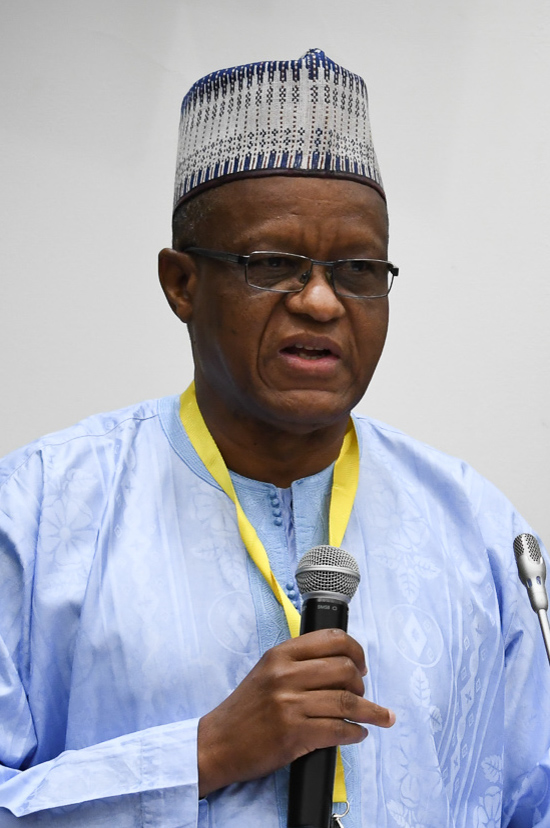“TOGETHER, WE ARE INDEBTED TO THE PEOPLE OF THE SAHEL”

Interview of Mr. Maman Sidikou, ES G5 Sahel, at the end of the 3rd Steering Committee of the Sahel Alliance.
“The Sahel Alliance is an important partner for the G5 Sahel because of the role it plays in the harmonization and dialogue with donors operating in the five states.
We are mutually accountable to each other, but more importantly, we are collectively accountable to our people for results. There is indeed public scepticism and we must address these doubts regarding the gap between promises and interventions with tangible impacts together. This is a major challenge for the implementation of the Emergency Development Programme (PDU) and the Priority Investment Programme (PIP) on the ground. It is important to go beyond the big figures that were announced and talk concretely about the results. These matters were discussed at the last Sahel Alliance steering committee meeting and we mentioned the Integrated Territorial Development Programme (PATI): an intervention in the Tri-border region that finances a pilot cross-border cooperation initiative between municipalities in the Sahel (Burkina Faso), Timbuktu (Mali) and Tillabéri (Niger) regions in which 5.5 million people live. The pastoral economy and health in general are crucial for the resilience of this region, which is home to 30% of the livestock of the three countries. During the handover of the renovated health centre in the town of Dori in Burkina Faso, we witnessed the great enthusiasm of the people and the authorities. This enthusiasm demonstrates the difficulties encountered by the States and the essential needs in the areas of security and health. For us, this UEMOA-funded pilot project is a success story that we want to build on to implement projects that will make a difference for the people of the Sahel.”
Towards an integrated and more pragmatic approach
“The third steering committee of the Sahel Alliance was a constructive meeting. The participants contributed to the holding of a tangible and concrete session. I am particularly pleased with the progress achieved in 3 priority areas. First of all, the convergence of the Sahel Alliance towards the model of the integrated territorial approach, which had already been mentioned at the General Assembly of 25 February in Nouakchott. Secondly, the issue of financing instruments for development projects. We cannot wage the war for development without a strategy or relevant and easily mobilized resources. A long time ago, when I was working on the issue of adult education during my doctoral thesis, I was in Burkina Faso with peasants and they would often ask me: “plan, plan, … what are you talking about? ». We need funds and instruments. We must therefore be careful not to become entangled in endless procedures. The third point relates to the use of local operators for the implementation of interventions. This is essential for appropriate and sustainable development. We need to find the right formulas in the Sahel. We have begun to talk about this, and dialogue must continue with our partners in the Sahel Alliance. Sometimes people think that when we talk about local operators, only international organizations can work there, but it is necessary to dig a little deeper and create other partnerships focused on implementation and the ” percolation of development aid to the bottom of the pyramid”.
Local authorities, a key stakeholder
“Concerning the Integrated Territorial Approach (ITA), you speak of multisectoral approaches centred on crisis basins, but I prefer to recall the importance of targeting the most vulnerable areas. This is why the Integrated Priority Action Framework (CAPI) that we have developed with the EU has become central and was adopted at the Summit of Heads of State. The CAPI promotes quick impact actions in fragile areas and a territorial approach based on the active involvement of elected representatives and stakeholders in decentralisation. At the GA of the Sahel Alliance on 25 February, an important framework agreement was signed with local authorities. This level of local intervention makes it possible to develop relevant service provision, to use local companies and to strengthen local communities and public authorities. If we proceed in this way, there will not even be a need to communicate on projects, local stakeholders will communicate for us, and they will do it well. ”
Combining efforts in a complementary manner
“One of the priorities for the G5 Sahel is to continue to combine our efforts in complementarity with our partners to achieve our common goals. Nearly twenty partners support us and the willingness to move forward is remarkable. Other partners such as the Arab Bank for the Development of Africa (BADEA) complement the interventions of the Sahel Alliance. The interventions of the African Development Bank (AfDB), the bank of our States and a member of the Sahel Alliance, in the response to Covid-19 seem very interesting to us because they favour development as part of a territorial approach that is as close to the communities as possible. AfDB uses the services of a United Nations agency, UNHCR, with which we are linked and which works in the field with the State, communities and other relevant stakeholders.
In the coming months, we hope that our architecture will work better by placing the field at the centre of our concerns. At the last Sahel Alliance Steering Committee meeting, a clear consensus emerged on points for action. Let us turn them into tangible results so that we can communicate on an impact for stability and prosperity. We are in discussions with the Organisation Internationale de la Francophonie and several partners to design a radio station dedicated to youth, a priority of the Mauritanian Presidency of the G5 Sahel. Such an instrument would contribute to social cohesion and prosperity in our region – while allowing us to inform the population about our achievements.”

